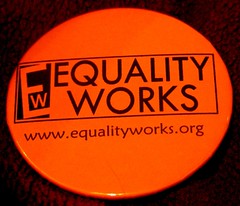Yesterday I came across a new opinion piece in the Anchorage Press called “Prevo’s right, sort of” by Anchorage pollster Ivan Moore. It was about the Anchorage equal rights ordinance, of course, so I went on to read it, figuring to stick it in the “supports ordinance” or “doesn’t support ordinance” listing on my Equality page‘s listing of resources about the ordinance, whichever applied.
But y’know, I couldn’t figure out which category applied. Both? Neither? Just like its title, it seemed like six of one, half a dozen of the other: Mr. Moore wanted the ordinance to pass, but he didn’t. Maybe he wanted two ordinances. I dunno. It was hard to figure. Still is.
Mr. Moore seems clearly to favor adding sexual orientation to the Muni’s equal rights code. He also claims to favor protecting people from discrimination on the basis of gender identity. But he’s got a problem with the definition of sexual orientation as written in the proposed ordinance because, he says, the definition confuses the two. And he wants gender expression tossed altogether.
Here’s the definition of sexual orientation as contained in the ordinance:
Sexual orientation means actual or perceived heterosexuality, homosexuality, bisexuality or gender expression or identity. As used in this definition, ‘gender expression or identity’ means having or being perceived as having a self-image, appearance, or behavior different from that traditionally associated with the sex assigned to that person at birth.
The problem is, as Moore points out, that sexual orientation and gender identity are two different things. In the word of Jennifer Finney Boylan the male-to-female transsexual whose book I’m Looking Through You Moore is reading right now, sexual orientation is “about who I wanted to go to bed with” — i.e., which sex one is physically and emotionally attracted to; whereas gender identity is about “who I wanted to go to bed as” — i.e., whether one understands oneself to be, at root, female or male.
So to Moore, because the definition the ordinance’s crafters are using seems to include gender identity as a subset of sexual orientation, it’s wrong. So wrong, in fact, that the definition even plays right into the hands [gasp!] of the scatalogically-fascinated Prevo et al. religious right, much to Moore’s colorful chagrin:
By contrast, religious definitions of sexual orientation all intermingle the concepts of gender identity and sexual behaviors, all of them filthy nasty, for no other reason than because it’s in their puritanical interests to do so.
The shockingly numbnuts move here was that the AKCLU and Pat Flynn and whoever else was responsible for crafting this ordinance played right into their bigoted hands by including gender identity and gender expression as “subsets” of sexual orientation.
What’s Moore’s solution?
On June 9, the Assembly should cut the words “or gender expression or identity” and the related language, and simplify the ordinance down to its real intent, to protect gays from being discriminated against. Gender expression and identity are simply not nice tidy subsets of sexual orientation, and so their placement as such is wrong. Personally, I think they should consider the inclusion of gender identity, but separately from orientation. Gender expression should be gotten rid of entirely, the mostly heterosexual crossdressers can just freaking do it in private, and the drag queens… well they don’t care, they like the controversy anyway.
The part I’ve emphasized in bold is what has really created a stir amongst supporters of the ordinance. It gave a lot of us the feeling that Moore was advocating — if only “temporarily” — throwing transfolk under the bus this go ’round. Something like the way John, one of the people whose commented on the story on Anchorage Press‘ website, thought. John opined:
Ivan’s polls are usually accurate, and his opinions are also worth considering. He makes a good point here. I think Sexual Identity is also worth protecting, but it is different than Sexual Orientation (or preference if you prefer). Let’s take the easy one first and see how that works.
So here we see equal protection from discrimination for lesbians, gays, and bisexuals, along with heterosexuals, described as “the easy one” (wow, I’ve been involved in these battles before — you call this easy?!!!), but transsexual/transgender people? They can just wait.
Let’s be fair to Mr. Moore. He did say, already included in the quote above:
Personally, I think they should consider the inclusion of gender identity, but separately from orientation.
And earlier today, addressing other people’s comments (including mine) on his article, he said further:
I’m not throwing anyone under the bus. I would be the first to vote in favor of gender identity as a separate protected class if I was on the assembly. But it just doesn’t belong under the umbrella of orientation.
Well, Mr. Moore, I’m afraid I’m going to have to wait until you’re on the Assembly to try testing that out. Meanwhile, I’m sorry to say that I’ve got the same suspicion that a lot of other folks have had: did Moore, a politically-connected pollster, write the article to float a possible compromise on the ordinance, much along the lines of what commenter John wrote: “Let’s take the easy one first and see how that works”? Let’s just do gender identity as a separate thing — but not quite specify whether that should be done now, or later. And since it is true that gender identity and sexual orientation are two different phenomenon — we’ll just use that definitional nitpickiness as a wedge to kinda split the two apart — one can hardly complain about the integrity of our nomenclature, can one? Oh yeah, and that other pesky part of the definition, the part about gender expression? — well, let’s just toss that part out altogether, because after all, Prevo is right (says Moore) about the spectre of predatory guys in dresses invading the women’s restrooms of the Anchorage heartland. Wrote Moore:
Gender expression? I tell you, JERRY PREVO IS RIGHT! Some guy with a beard is going to get dolled up in a fearsomely attractive outfit and go hang out in the ladies bathroom in City Hall, looking for a lawsuit. Men aren’t going to be lining up to troll the ladies bathroom looking to “prey on women and children” like the loopy right says they will, but the fact that the law could be made an example of in this way shows that it is bad public policy. I bet you someone does it, just to make a point.
And as previously quoted:
Gender expression should be gotten rid of entirely, the mostly heterosexual crossdressers can just freaking do it in private, and the drag queens… well they don’t care, they like the controversy anyway.
Which all just means to me that, whatever else of Prevo’s that Moore has steered clear of, he’s swallowed one of his super smelly stinky inedible red herrings — in this case the one about what gender expression means — hook, line, and sinker — and somehow without managing to arf the smelly red herring up all over his keyboard.
(Unless he didn’t.)
So what the heck is gender expression, then?
My mom would’ve known what gender expression is, because to her frustration, all our lives that we shared together, I simply wouldn’t cooperate with the gender expression she thought I ought to have. Female as I was, female as I continue to be, I simply refused to be feminine. I hated wearing dresses; nylons, shiny slick high-heeled dress shoes. Put barrettes in my hair — I’d take ’em out as soon as I got out of sight. She cried when I wouldn’t wear a dress under my cap and gown when I took my diploma at my college graduation. As a poem I wrote to her long ago ends,
I will not be your daughter in a dress
but I am your daughter and
I want you to accept me
because I love you.
She did, too, because in the end my mom always knew what was really important. And so I haven’t worn a dress since my oldest brother’s wedding in 1982. Even now I feel completely wrong, not myself, to wear women’s-cut t-shirts, blouses with lace or puffed-up sleeves, anything that’s designed to show off cleavage. (Outer wear, that is — what I wear “under” would meet my mom’s approval, no prob.)
So let’s look at this part of the ordinance definition again:
As used in this definition, ‘gender expression or identity’ means having or being perceived as having a self-image, appearance, or behavior different from that traditionally associated with the sex assigned to that person at birth.

A recent depiction of my typical gender expression (with Sydney, my neighbor's sister's ball python)
Unlike a transsexual person, who has a self-image different from the sex assigned to that person at birth, my self-image completely matches my biological sex: I am female. But I don’t express my femaleness in the way my mom always wanted me to express my femaleness, with the clothing and other accoutrements that I was told from knee-high was supposed to fit me to my sex. It didn’t fit me. It made me feel like someone being forced to be something, someone, that she is not. It’s still that way. I’m your proverbial lesbian-in-sensible-shoes. And trousers, t-shirt, and baseball cap.
So when I see gender expression in the proposed ordinance, amongst other things I see is me being protected from getting fired, evicted, or otherwise unfairly discriminated against only because I don’t fit someone else’s arbitrary idea of “femininity.” If I’m qualified and do the job well, if I have a good credit rating and pay my rent on time, what right does my employer, landlord, or anyone else to tell me that I must wear a dress or lipstick in order to match their concept of how I should express my genderedness? Doesn’t mean I won’t dress nicely if the job demands it. Does mean that I can’t be forced into a dress or lacy blouse, pocketsless pants, and lipstick. And let’s not forget that my appearance (which, yes, often gets me once-overs in women’s rooms & “sirs” in stores) marks me to people with the slightest bit of gaydar as a lesbian. If the ordinance passes with only sexual orientation as part of it, I’m still fair game for arbitrary discrimination — the agent of bias can always just hide their anti-lesbian sentiments when they explain to the Equal Rights Commission: “Hey, I’m within my rights — I didn’t like her gender expression.”
Not all lesbians are like me in this regard — we’ve got our “lipstick lesbians.” Nor are all heterosexual women unlike me in this regard. Same goes for men: there are so-called “effeminate” men of all sexual orientations, just as there are “macho” men of all orientations.
Then there’s the gender expression of transfolk, for which another definition, this one from About.com, might be helpful in understanding:
Gender Expression is the physical manifestation of one’s gender identity, usually expressed through clothing, mannerisms, and chosen names. Transgender people usually have a gender expression that matches their gender identity, rather than their birth sex.
So gender expression is another part of the protection designed into the proposed ordinance for transsexual/transgender people, just as much as it is for more “masculine” or “butch” women like me, regardless of sexual orientation; or more “feminine” or “androgynous” men like — oh, say, Prince — who has a well-documented history as a heterosexual. For transfolk, being protected from unfair discrimination on the basis of gender identity without also being protected on the basis of gender expression is just another way of saying: you’re not protected. Particularly those transfolk who are in the midst of undergoing the long, arduous process of so-called sexual reassignment, which generally requires lengthy periods of time living according to their gender identity (as opposed to the sex they were assigned at birth) even before they’re permitted to undergo any sexual reassignment surgeries.
So you see what Ivan Moore is throwing under the bus by accepting Prevo’s skewed and fear mongering “definition” of gender expression at face value.
Later in comments on his Anchorage Press article, Mr. Moore added a comment:
I’ve changed my mind on one point. If a beardo dressed up as a woman and hung out in the ladies restroom, he would probably still be arrested and led out in cuffs. Just because a man could be guaranteed freedom from discrimination based on gender appearance, that wouldn’t make him a woman. And last time I looked, men weren’t allowed in the ladies’.
Bingo! This is at least a step in the right direction — though I am helpless not to point out Andrew Halcro’s much more elegant (and refreshingly campy!) takedown of Prevo’s ludicrous beardos-in-the-bathroom meme on June 1 in the Alaska Dispatch. (Which just goes to show you that camp isn’t restricted to drag queens — Mr. Halcro is also a well-documented heterosexual, with wife and two adult children. You go, Andrew!)
Meantime I suppose we must take at his word Mr. Moore’s assurance that he is as much in favor of protecting people from arbitrary discrimination based on gender identity as he is on sexual orientation. And hope that he will read beyond Jennifer Finney Boylan’s book and Rev. Jerry Prevo’s raise-funds-for-the-Anchorage-Baptist-Temple-through-a-pack-o’lies website to come to a more complete understanding of gender expression.
Meantime, I personally am satisfied that the crafters of the ordinance perfectly well understand the difference between actual or perceived heterosexuality, homosexuality, bisexuality or gender expression or identity — the terms included for convenience, if not strict sexologist definition, as being covered by the proposed ordinance’s term sexual orientation. I haven’t met even one lesbian, gay, bisexual, or trans person — I have talked with lots and lots of them — who is in the least bit confused with the definition as used in the proposed ordinance, or fails to understand why the Assembly in crafting it chose to use sexual orientation as an umbrella covering all three related but different terms: sexual orientation proper, gender identity, and a term that applies to members of all sexual orientations and gender identities in one way or another, gender expression.
And meantime, if there is any question at all about whether the LGBT community or our allies, will accept some sort of politically expedient “throw the transfolk under the bus” compromise in order to buy protection for the “easy” bunch of us, think again.

Ptery, my 16-year partner, in early transition as a female-to-male transsexual (& who I'm not going to throw under a bus)
One of the first questions I had about this ordinance when I first learned it would be proposed was “will it also include transpeople?” That’s not just a matter of some ideal of LGBT unity with me: my partner of 16 years (now my ex for complex & mainly unrelated reasons), after many long years of struggle with feelings about gender identity, came out as transman last fall. Is he any less deserving of protection from discrimination than I am? The answer isn’t far from my heart at all: if gender identity were written out of this ordinance, my support for it would instantly evaporate, on those grounds alone. I could not face my the woman I fell in love with 16 years ago who now knows himself as a man if I were to stand still for such a betrayal. I couldn’t face my trans friends. I couldn’t face anyone. Nor will the rest of us.
In the words of Equality Works’ recent press release (posted earlier here):
People need protection from discrimination on the basis of their gender identity/expression. No one — straight or gay — should be treated unfairly in work or the public sphere. Equality Works believes the small minority of transgender people in our community — people who have served in our military, who drive our taxis, and who have children and families to provide for — are no less deserving of employment and housing than anyone else. While some in our community try to paint transgender people as a dangerous threat, transgender men and women are far more likely to be the targets of violent harassment and discrimination than those who would refuse them equal opportunity under the law.
In the words of the my friend E. Ross at Bent Alaska:
Don’t play Prevo’s divide-and-conquer game. Stand with us in support of a transgender-inclusive nondiscrimination policy.
… And now I check the comments on Mr. Moore’s article again, to find that Ivan Moore added another comment today at 4:00 PM:
I am not trying to divide and conquer, that’s absurd. If I have an agenda here at all, it is to see something get passed that is amenable to both sides. I think the religious right would live with the ordinance just on gay-straight orientation.
There you have it. He does want to just do the “easy” stuff now, in order to satisfy the blind prejudice and willful ignorance of the Prevo-dominated radical right. Transfolk, in his opinion, can wait.
The way it’s written right now, I think it comes back to us as an initiative, it will go to the voters, the community will really fight a war, and your “side”, knowing Anchorage, may end up with NOTHING.
Well, I guess that’s the risk we’ve decided to take. It’s not amenable to our “side” to betray transfolk for political expediency. We stand together.
In the words of one of my friends who stands at the forefront of this decades-long fight for equality:




Pingback: Important Update on the Equal Rights Ordinance « SOS Anchorage